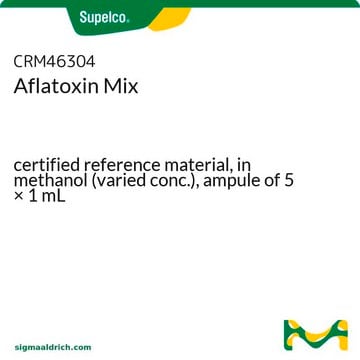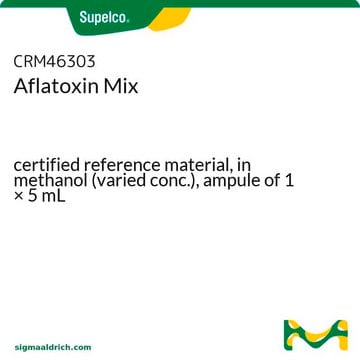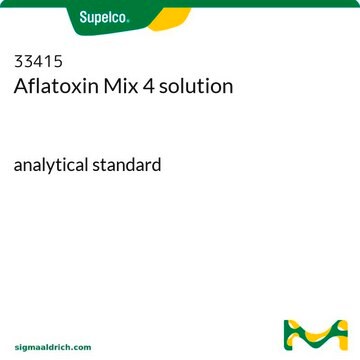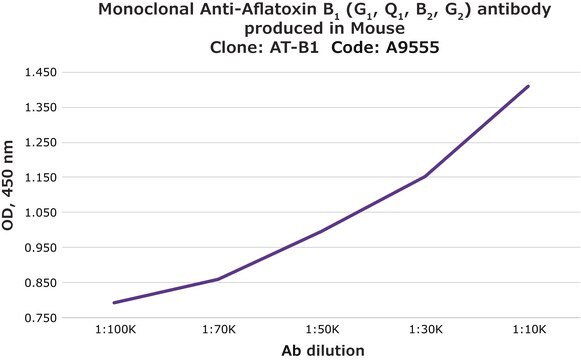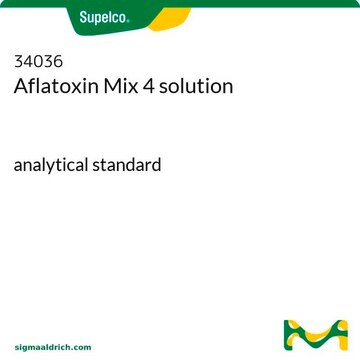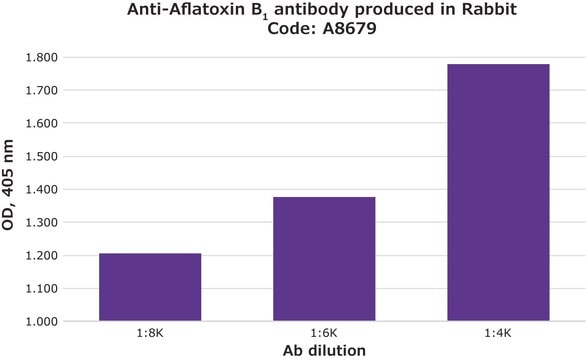Recommended Products
storage temp.
2-8°C
General description
Aflatoxin is the most common food toxin that is harmful to human and animal health. The most frequent aflatoxins are B1, B2, G1, and G2, which can affect the body through respiratory, mucosal, or cutaneous routes, causing an excessive inflammatory response. Aflatoxin can infect crops during their growing stages or even after they are harvested. It mainly targets the liver and can impair the effectiveness of immunization in children, increasing the risk of infection. Aflatoxin detection and quantification in food and feed is a critical part of food and feed safety concerns. The absorption and emission spectra of aflatoxins are commonly used to detect and identify them, with the highest absorbance occurring at 360 nm. Aflatoxin is frequently degraded, mitigated, and managed using a variety of treatments, including chemical, physical, and biological approaches.
Aflatoxins are hepatotoxic metabolites. They are produced by molds, such as, Aspergillus flavus and Aspergillus parasiticus. They are naturally found poisonous carcinogens and the most widely known mycotoxins.
Packaging
Four aflatoxins from Aspergillus flavus
related product
Product No.
Description
Pricing
Signal Word
Danger
Hazard Statements
Precautionary Statements
Hazard Classifications
Acute Tox. 1 Dermal - Acute Tox. 1 Oral - Acute Tox. 2 Inhalation - Carc. 1B - Muta. 1B - Repr. 2
Storage Class Code
6.1A - Combustible acute toxic Cat. 1 and 2 / very toxic hazardous materials
Certificates of Analysis (COA)
Search for Certificates of Analysis (COA) by entering the products Lot/Batch Number. Lot and Batch Numbers can be found on a product’s label following the words ‘Lot’ or ‘Batch’.
Already Own This Product?
Find documentation for the products that you have recently purchased in the Document Library.
Customers Also Viewed
Review of past and present research on Aflatoxin in Uganda
Sittig's Handbook of Toxic and Hazardous Chemicals and Carcinogens (2008)
Review of past and present research on Aflatoxin in Uganda
Kaaya NA and Warren HL
African Journal of Food, Agriculture, Nutrition and Development, 5(1) (2005)
Review of past and present research on Aflatoxin in Uganda
Sittig's Handbook of Toxic and Hazardous Chemicals and Carcinogens (2008)
Pradeep Kumar et al.
Frontiers in microbiology, 7, 2170-2170 (2017-02-02)
The aflatoxin producing fungi, Aspergillus spp., are widely spread in nature and have severely contaminated food supplies of humans and animals, resulting in health hazards and even death. Therefore, there is great demand for aflatoxins research to develop suitable methods
Production of aflatoxin on rice
Shotwell OL, et al.
Applied Microbiology, 14(3), 425-428 (1966)
Our team of scientists has experience in all areas of research including Life Science, Material Science, Chemical Synthesis, Chromatography, Analytical and many others.
Contact Technical Service
